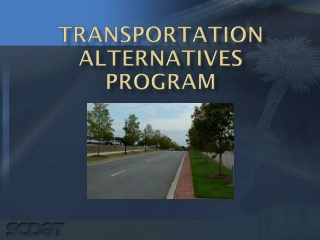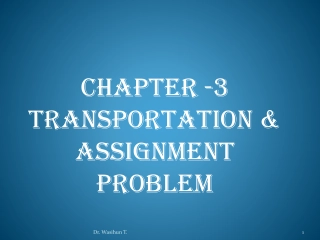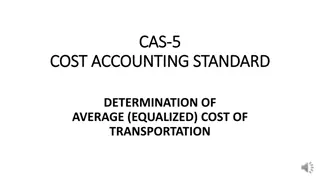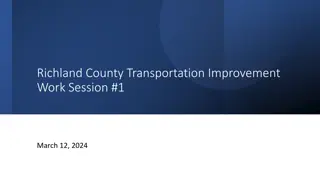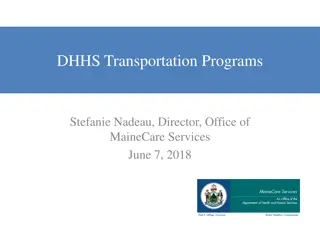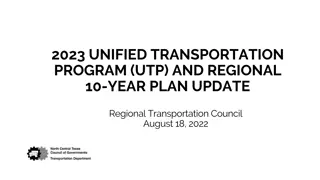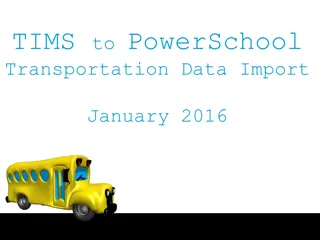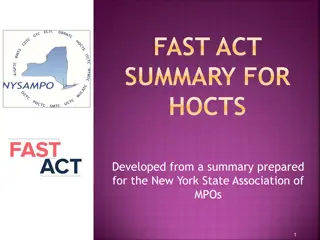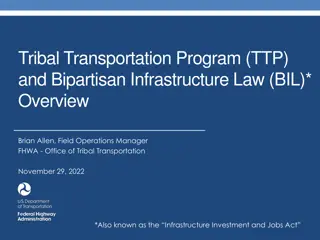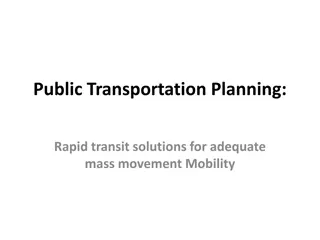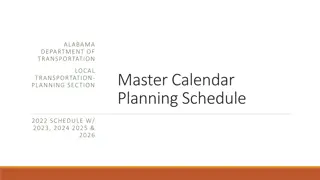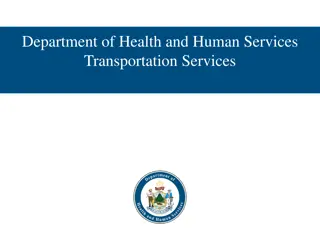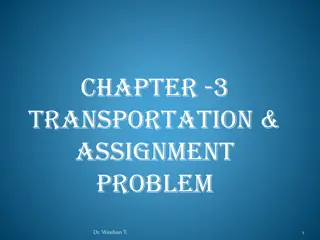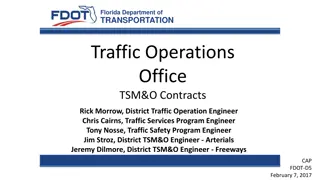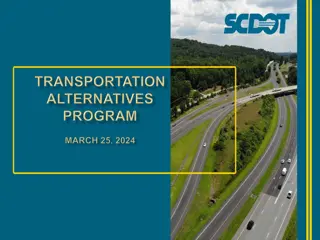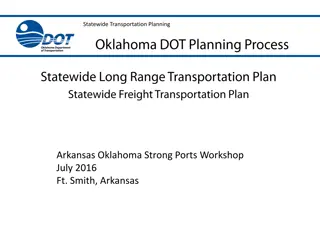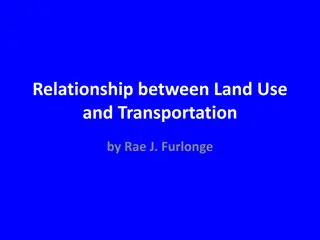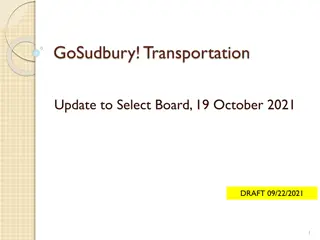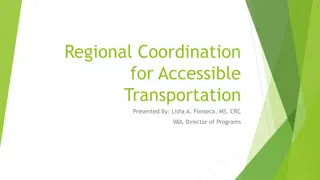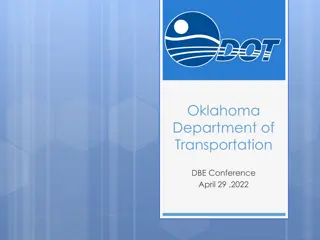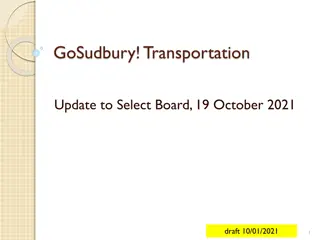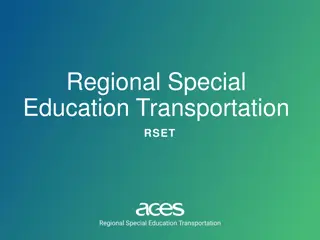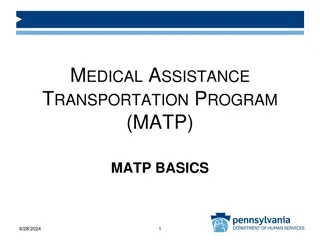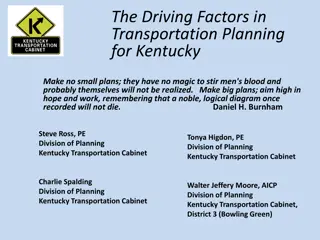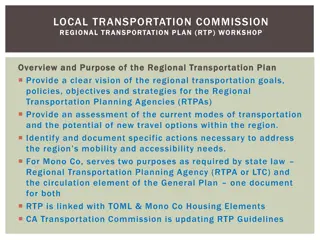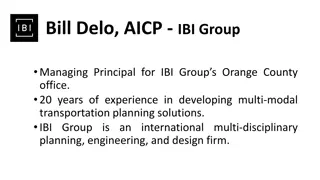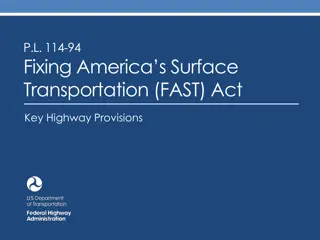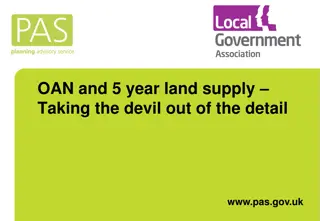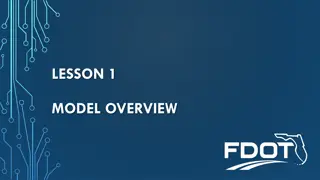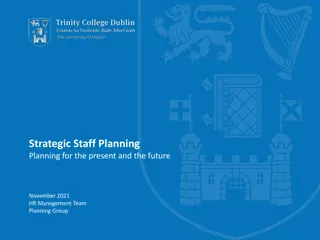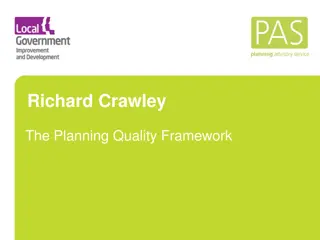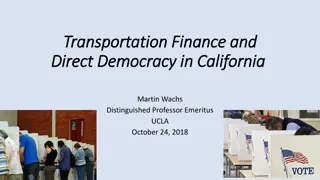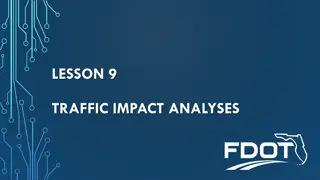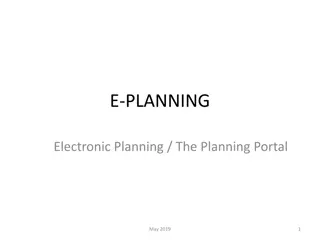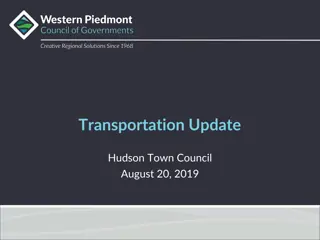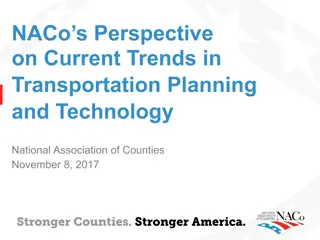Funding Opportunities for Non-Motorized Transportation in South Carolina
The US Department of Transportation's Federal Highway Administration provides funding to South Carolina through the Transportation Alternatives Program (TAP) to support non-motorized transportation initiatives. Local governments, schools, and other entities can partner with the South Carolina Depart
1 views • 21 slides
Transportation & Assignment Problem Overview
The transportation problem involves optimizing shipment costs from multiple sources to multiple destinations with known supply and demand constraints. This chapter discusses the characteristics of transportation problems, key assumptions, and how to formulate the transportation model. Dr. Wasihun T.
0 views • 64 slides
Enhancing Transportation Performance Management through TSMO Collaboration
Advancements in technology and evolving customer needs are driving changes in transportation management. Transportation Systems Management and Operations (TSMO) offers strategies to optimize operational performance, complementing traditional capacity projects. Collaboration between TSMO and Transpor
1 views • 77 slides
Cost Accounting Standards for Determining Transportation Costs
Understanding the importance of transportation costs in procurement and distribution, this guide outlines the standards for determining average costs, separation of transportation costs in accounting records, objectives for maintaining cost uniformity, components of transportation costs, and treatme
0 views • 11 slides
Understanding Transportation Programs and Trends
Transportation training session led by Megan Johnson, featuring topics such as Transportation Crash Course, Training Opportunities, and Transportation Trends & Updates. Includes discussions on different types of transportation services and their importance for communities.
2 views • 38 slides
Richland County Transportation Improvement Summary
Richland County's transportation improvement work includes sessions on project principles, funding options, project costs, and guidelines for utilizing the transportation penny. The focus is on addressing transportation needs, project prioritization, funding challenges, and division of funds for var
0 views • 19 slides
Transportation Planning and Data Collection Insights
Understanding transportation planning involves various stages such as data collection, study area definition, and selection of external cordon lines. Collecting data on existing travel patterns, transport facilities, and land use is crucial for formulating effective transportation plans. Defining th
0 views • 27 slides
Strategic Planning for Sustainable Development: A Comprehensive Overview
Planning and strategic planning play crucial roles in achieving sustainable development goals. This presentation delves into the concepts of planning, strategic planning, sustainable development, the SDGs, types of planning, steps in the strategic planning process, and the importance and challenges
0 views • 20 slides
Maine DHHS Transportation Programs Overview
The Maine Department of Health and Human Services (DHHS) oversees various transportation programs aimed at providing non-emergency transportation services to low-income, child welfare-eligible, and Section 17-eligible individuals. These programs are managed through regional brokerage systems, with b
3 views • 5 slides
Regional Transportation Council's 2023 Unified Transportation Program Update
The Regional Transportation Council discussed updates to the 2023 Unified Transportation Program, focusing on Category 2 funding discrepancies, proposed project adjustments, development principles for the 10-Year Plan, and regional funding allocations for 2017-2023 UTPs. The plan emphasizes performa
1 views • 14 slides
Importing TIMS Transportation Data into PowerSchool
Explore the process of extracting, formatting, purging, and importing TIMS transportation data into PowerSchool for efficient management of student transportation information. This includes creating TIMS extracts, updating bus stop information, and optimizing transportation planning through geocodin
2 views • 43 slides
Overview of FAST Act for Transportation Planning
The FAST Act, passed in 2015, authorizes federal programs for transportation development with a focus on surface transportation. It extends funding through 2020, totaling $304.7 billion. The Act aims to enhance resiliency, reliability, and stormwater mitigation in transportation systems. Planning fa
2 views • 10 slides
Tribal Transportation Program & Bipartisan Infrastructure Law Overview
The Tribal Transportation Program (TTP) and Bipartisan Infrastructure Law (BIL) provide funding for essential transportation projects in Tribal communities. The TTP Bridge Fund, Safety Fund, and High Priority Projects aim to improve infrastructure and safety. The BIL funding for FY22-FY26 totals $3.
1 views • 13 slides
Efficient Public Transportation Planning for Mass Mobility
Rapid transit solutions like high-capacity public transportation systems, including overground rail, underground rail, trams, and BRT systems, play a crucial role in enhancing mass movement efficiency. Factors such as journey time, transport costs, vehicle operating costs, and the benefits of rapid
1 views • 20 slides
Alabama Department of Transportation Local Master Calendar Planning Schedule 2022
The schedule outlines various tasks to be completed by the Alabama Department of Transportation for the year 2022, including urban funds reporting, performance measures tracking, certification reviews, archival tasks, cube voyager invoicing, reporting to MPOs, and work program calculations. The deta
1 views • 61 slides
DHHS Coordination of Transportation Service Contracts Overview
The Department of Health and Human Services in Maine conducted an assessment of Transportation Services in June 2019. The workgroup identified three main priorities: alignment of Quality and Performance Measures, Safety Measures, and Evaluation of Transportation Services. The first priority involves
0 views • 28 slides
Understanding Transportation and Assignment Problem
Transportation and assignment problems involve optimizing the shipment of goods from various sources to multiple destinations while minimizing total transportation costs. These problems deal with limited supply, known demand, constant shipping costs, and integer quantities. The transportation algori
0 views • 64 slides
Florida Department of Transportation Projects Overview
The Florida Department of Transportation is actively engaged in various transportation projects including Traffic Operations, Planning & Environmental Management, TSM&O contracts, Integrated Corridor Management, and Connected Vehicle Pilots. The projects involve a range of activities such as freeway
0 views • 8 slides
Enhancing Transportation Infrastructure Through Federal Funding Programs
The Transportation Alternatives Program (TAP) funded by the USDOT's Federal Highway Administration supports transportation projects in South Carolina based on population categories. TAP funds are allocated to Transportation Management Areas (TMAs), Small Urban Areas, and Non-Urban Areas, prioritizin
0 views • 21 slides
Statewide Transportation Planning Workshop - Ft. Smith, Arkansas July 2016
Explore the Statewide Transportation Planning workshop held in Ft. Smith, Arkansas in July 2016. The event focused on safe and secure travel, infrastructure preservation, economic vitality, and environmental responsibility in transportation planning. With an estimated total cost of $37.5 billion and
0 views • 18 slides
Understanding the Relationship Between Land Use and Transportation
The need for land use planning is crucial as land is a finite resource, and its utilization impacts the community. Sustainable transportation aims to increase mobility options while reducing driving. The state plays a vital role in land use activities such as planning, zoning, and infrastructure dev
0 views • 13 slides
Addressing Transportation Gaps in Sudbury: A Livable Community Approach
The Sudbury Transportation Committee, established by the Select Board, aims to enhance transportation in Sudbury to create a livable community. Focusing on inclusivity, equity, and addressing transportation gaps impacting various aspects of livability, the initiative seeks to improve social particip
0 views • 16 slides
Understanding Regional Coordination for Accessible Transportation
This presentation delves into the concept of regional coordination in accessible transportation, focusing on the Regional Transportation Advisory Panel, 5-year regional transportation goals, and the significance of the Safe, Accountable, Flexible, Efficient Transportation Equity Act. It emphasizes t
0 views • 16 slides
Oklahoma Department of Transportation DBE Conference Overview
Office of Mobility and Public Transit in Oklahoma oversees federal grant programs and provides financial and technical assistance for public transportation services. They focus on promoting Disadvantaged Business Enterprise (DBE) participation in transit contracting opportunities. Metropolitan Plann
0 views • 12 slides
Enhancing Livability in Sudbury Through Transportation Initiatives
The GoSudbury! Transportation Update to the Select Board on October 19, 2021 highlights the importance of addressing transportation as a key component of livable communities. The initiative aims to create a safe, secure, and inclusive environment by improving transportation options for residents of
0 views • 26 slides
Regional Special Education Transportation (RSET) Program Overview
RSET, which stands for Regional Special Education Transportation, is an initiative developed by ACES to help districts save money while safely transporting students to out-of-district placement sites. The program benefits districts by reducing transportation costs, addressing parent concerns, and ma
0 views • 13 slides
Understanding Pennsylvania's Medical Assistance Transportation Program (MATP)
The Medical Assistance Transportation Program (MATP) in Pennsylvania provides essential transportation services to access medical care. Governed by state plans and codes, MATP aims to offer access to medical, pharmacy services, chronic disease management, and preventative care. Transportation provid
0 views • 16 slides
Comprehensive Transportation Planning Framework for Kentucky's Infrastructure Development
Kentucky's state transportation planning involves creating big, ambitious strategies to enhance infrastructure, comply with federal regulations, and engage in dialogue with the community. The process incorporates factors such as traffic volumes, roadway data, accidents, development needs, and cultur
0 views • 28 slides
Regional Transportation Plan Workshop Overview and Elements
This information outlines the purpose and structure of the Regional Transportation Plan Workshop, emphasizing the goals, policies, and strategies for improving transportation within the region. It covers elements such as the planning process, needs assessment, regional and community policy, action i
0 views • 6 slides
Transportation Planning Study: San Clemente Arterial and Mobility Analysis
Experienced professionals from IBI Group conducted an in-depth transportation planning study for the City of San Clemente, focusing on enhancing mobility through alternative roadway packages. The study involved analyzing baseline conditions, developing road alternatives, and evaluating the impact of
0 views • 16 slides
Key Provisions of the FAST Act: Investing in America's Surface Transportation
The Fixing America's Surface Transportation (FAST) Act, signed into law by President Obama in 2015, provides $305 billion in funding over five years for various infrastructure programs. It aims to ensure funding certainty for infrastructure planning and investment, with a focus on highways and trans
0 views • 30 slides
Understanding the Planning Advisory Service: Key Facts and Recommendations
The Planning Advisory Service (PAS) is a vital resource for local planning authorities, funded by DCLG and established in 2004. This service aims to enhance planning services, drive improvements, and navigate changes within the planning system. PAS supports, promotes, and innovates planning practice
0 views • 28 slides
Understanding Travel Demand Models in Transportation Planning
Travel Demand Models play a crucial role in transportation planning by mathematically describing relationships among transportation systems and socioeconomic factors. This lesson provides an overview of travel demand modeling, including basic elements of a model, modeling steps, and advanced topics
0 views • 28 slides
Strategic Staff Planning for Future Success
Strategic Staff Planning involves aligning workforce to future goals through short and long-term approaches. It includes 3 Horizons, Operational Workforce Planning, and Strategic Workforce Planning to ensure capabilities match organizational strategies. The process spans from tactical short-term pla
1 views • 9 slides
Challenges in Government Planning: The Importance of Quality Frameworks
Research by Richard Crawley highlights concerns regarding government planning performance targets leading to perverse behavior and the need for a focus on good practices in local planning authorities. The Planning Advisory Service (PAS) since 2009 has been facilitating benchmarking to improve planni
0 views • 8 slides
Transportation Finance and Direct Democracy in California
Proposition 6 on November 6th has garnered attention, but voters in multiple states will decide on over 250 transportation ballot measures totaling over $55 billion. California, with a longer history and greater funding needs, has been at the forefront of transportation investments, including the us
0 views • 29 slides
Understanding the Importance of Traffic Impact Analysis in Transportation Planning
Traffic impact analysis plays a crucial role in evaluating the effects of proposed developments on transportation infrastructure. This analysis helps in identifying the potential burden on the community's transportation network and ensures that growth is managed effectively. By examining short- and
0 views • 60 slides
E-Planning: Revolutionizing Planning Processes with Online Functionality
E-Planning is a transformative initiative aimed at streamlining planning processes through the introduction of online services for planning applications, submissions, and payments. The project, established in 2016, focuses on enhancing efficiency and customer service in the planning sector. Applican
0 views • 17 slides
Transportation Update and Metropolitan Planning Organization Overview
This update covers the Hudson Town Council meeting on August 20, 2019. It delves into the role of Metropolitan Planning Organizations (MPOs), their responsibilities, and the Comprehensive Transportation Plan (CTP) along with its various aspects like prioritization processes and scoring methodologies
0 views • 22 slides
Exploring Current Trends in Transportation Planning and Technology
Join today's webinar hosted by NACo as they delve into the impact of transportation technologies on county planning, focusing on ITS implementation, educational needs within the transportation workforce, and the implications of technology on county services. Gain insights on how counties are adaptin
0 views • 7 slides
